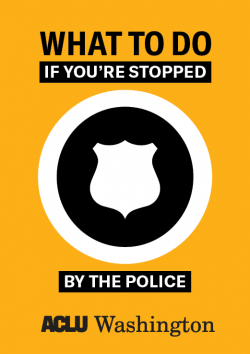Everyone has rights. These tips are meant to help you be safe and understand your rights under current Washington State law if the police stop you in public. Other kinds of contact with the police can raise more complex issues and you may need other resources.
Encounters with police can be highly tense and become dangerous. If your rights are violated, don’t try to deal with the situation at the scene. Seek help afterwards. If you need help finding a lawyer or want more information on your options, contact the ACLU of Washington:
Tips for Safety
- STAY CALM AND STAY PUT. Don’t run or suddenly move.
- KEEP YOUR HANDS where the officer can see them and free of any objects if possible.
- NEVER TOUCH any police officer.
- FOLLOW INSTRUCTIONS. You can always make a complaint later if you feel your rights were violated.
YOU HAVE THE RIGHT TO:
- ASK IF YOU ARE FREE TO LEAVE
- If the answer is yes, DO IT!
- Not every encounter with police is a “stop” and you may be free to just walk away.
- REMAIN SILENT
- Seriously, you don’t have to talk!
- You can say, “I’m exercising my right to remain silent” and then don’t speak.
- RECORD the interaction but be aware that holding or reaching for a mobile device may be viewed as threatening.
- ASK FOR A LAWYER immediately if you are arrested or taken to a police station. You don’t have to know a lawyer; you can ask for information to call one and they must provide it.
- DECLINE A REQUEST TO SEARCH your car, your home, your belongings, or your person.
- Calmly say “I do not consent to a search.”
- A warrantless search is allowed in some circumstances, but it is always helpful to say you don’t consent to a search.
- An officer can pat you down if they suspect a weapon.
- An officer can require that you show your ID if you are driving a car or in certain cases involving alcohol or marijuana; in WA State, police can’t ask passengers in vehicles for ID without individualized suspicion.
- An officer must have a warrant to enter your home unless they are responding to an emergency.
IF YOU FEEL YOUR RIGHTS WERE VIOLATED:
- WRITE DOWN everything you can remember, including the officer’s name(s) and/or badge number(s)
- TAKE PHOTOGRAPHS OF ANY INJURIES you incurred and SEEK MEDICAL ATTENTION even for minor injuries.
- CONTACT A LAWYER and consider FILING A COMPLAINT
For more information on your options, contact the ACLU of Washington:
Phone: 206.624.2180
(10:00-1:00, Tuesday-Thursday)
Mail: PO Box 2728
Seattle, WA 98111-2728
Online: aclu-wa.org/help





